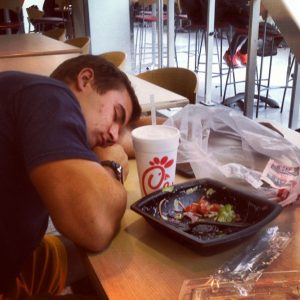We’ve all been there. After lunch, you are sitting in class with overwhelming drowsiness. This feeling has a terminology called “food coma” which is a state of drowsiness or lassitude following a meal. The reason that causes food coma has been studied for many years, and scientists are still researching it and having arguments.
A popular statement is that the food coma after eating is related to amount of carbohydrates in the meal. Meals that are high in carbohydrates cause an increase in the hormone insulin. The ensuing high level of insulin promotes large removal of the branched-chain amino acids by muscle, thereby lowering the plasma levels of these amino acids. As a result, the entry of branched-chain amino acids into the brain is reduced, while more tryptophan enters the brain. Tryptophan is a special amino acid that in the brain can be converted into a signalling chemical called serotonin. Serotonin is associated with feeling of sleepiness and drowsiness. The more Serotonin existed in brain, the stronger drowsiness you will feel.
A study in fruit flies sleep patterns discovered that, just like us, they slept longer after large meals, and there were some foods that were much better at letting them sleep than others. The research also reveals that salty or protein-rich foods promote sleep, whereas sugary foods do not. In their experiment, feeding high-protein and large meals to the fruit flies caused them to sleep up to 40 minutes more than they usually would if they hadn’t eaten anything. And high-salt meals increased the fruit flies sleep period by nearly the same amount. High carbohydrate meals, however, did not change the flies’ sleep patterns in comparison with their sleep patterns after not eating. The researchers found that specific brain circuits are likely to cause the desire for post-feast naps. The food coma effect is weaker or stronger at a different time of the day. For the fruit flies, the effect is stronger in the morning than in the evening. This indicates that the body’s internal clock also plays a role in a time when we are most likely to feel sleepy after a meal, especially after lunch.
More research will be happening to study what is the major reason that causes food coma. It will then give us a direction on how to adjust our dietary habits for diminishing food coma after a meal. Hope that day will be coming soon!
-Olivia Yang-



2 responses to “Who Takes the Responsibility of Food Coma?”